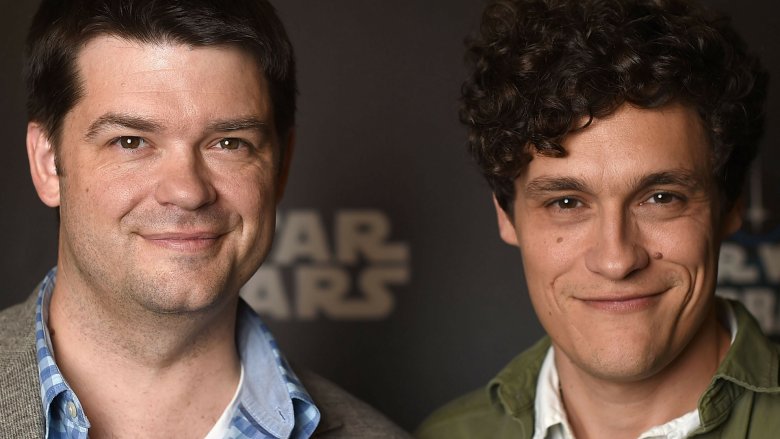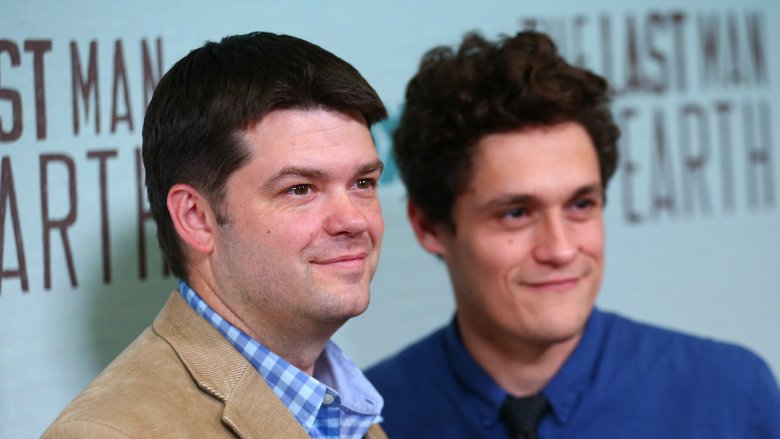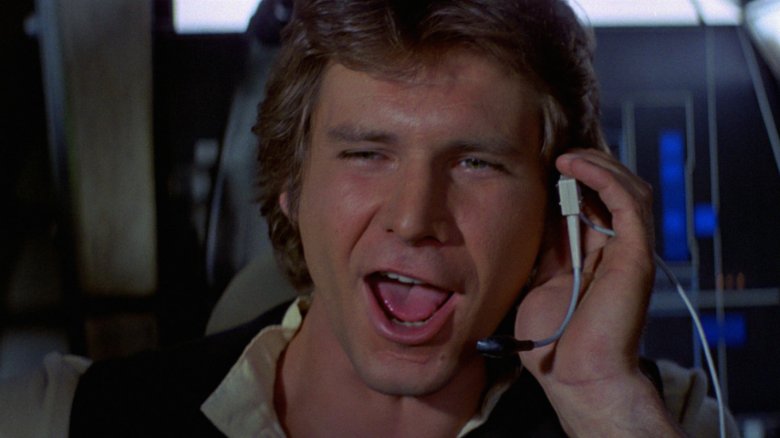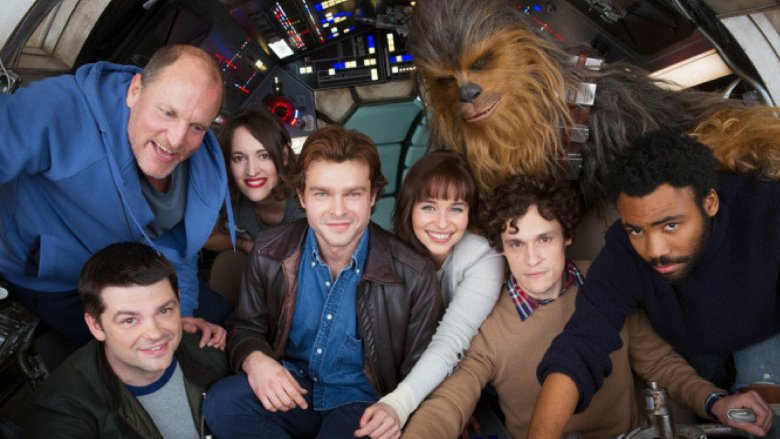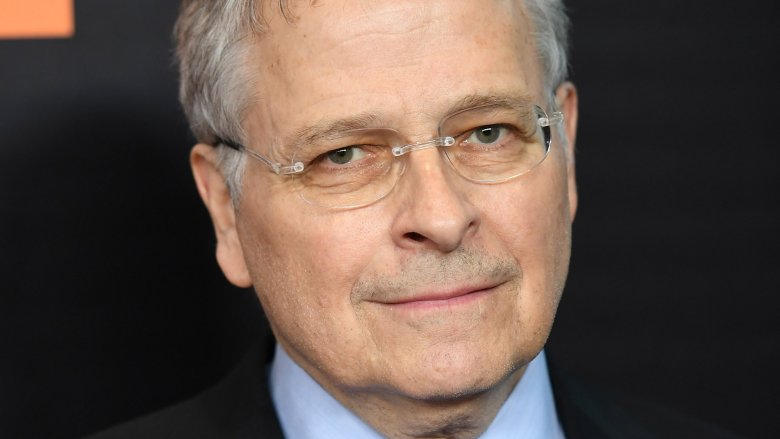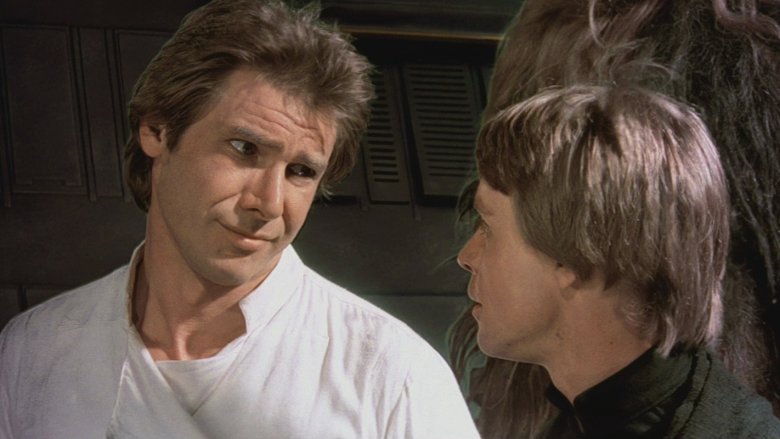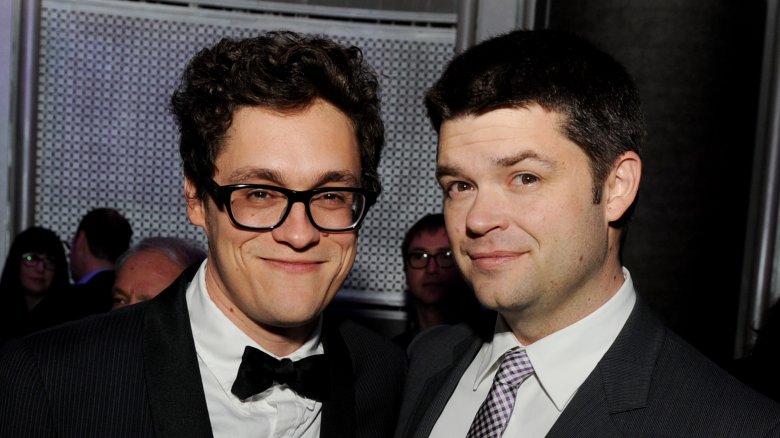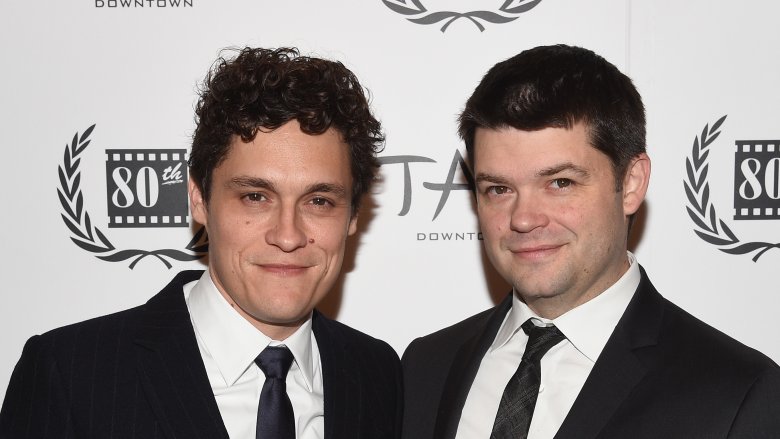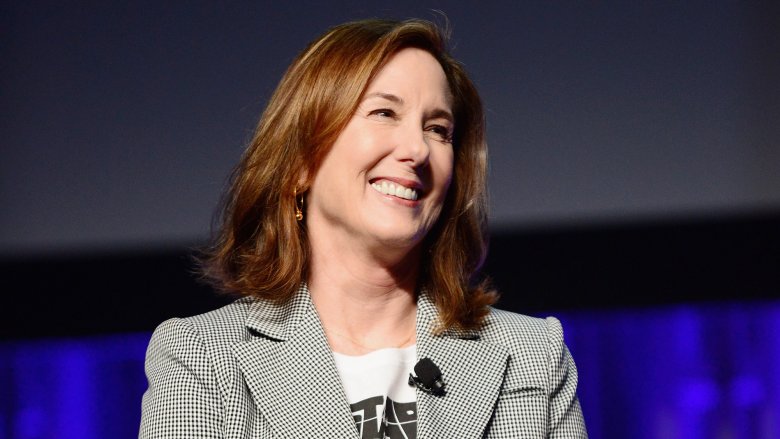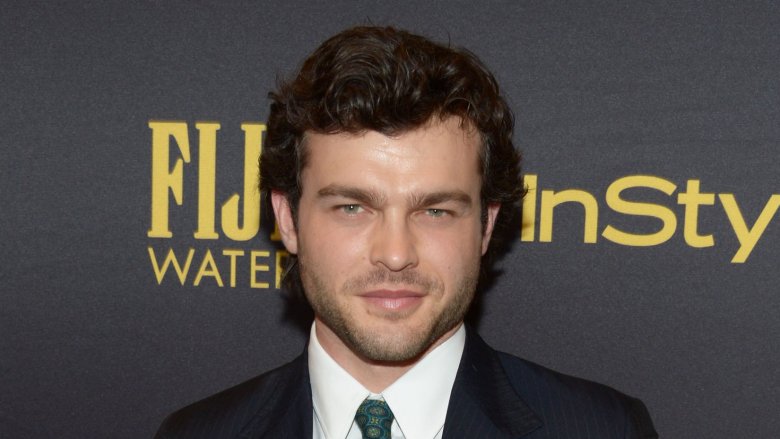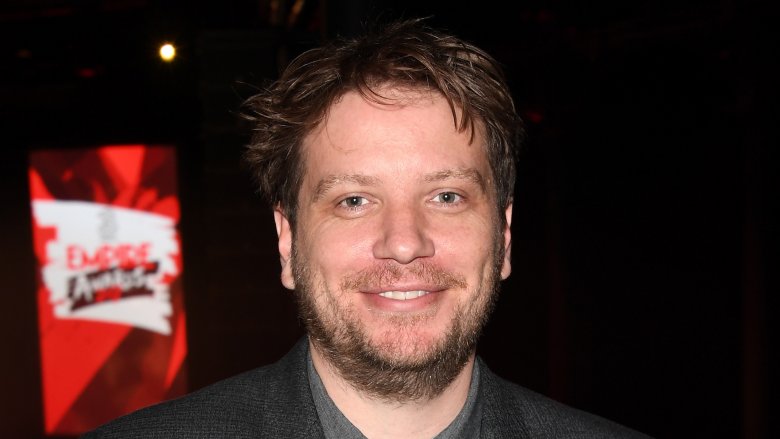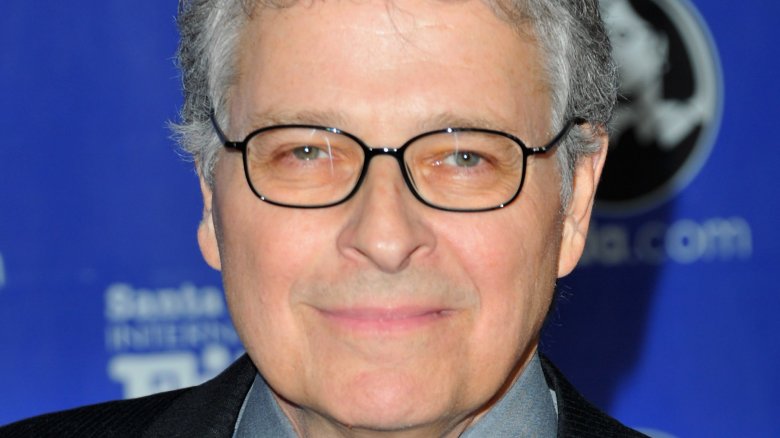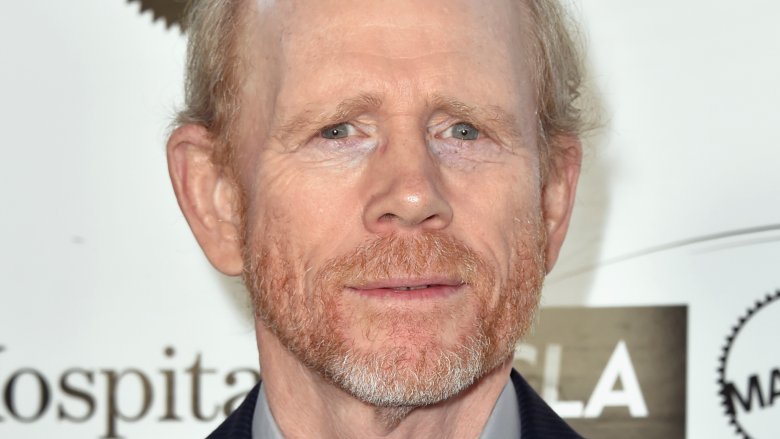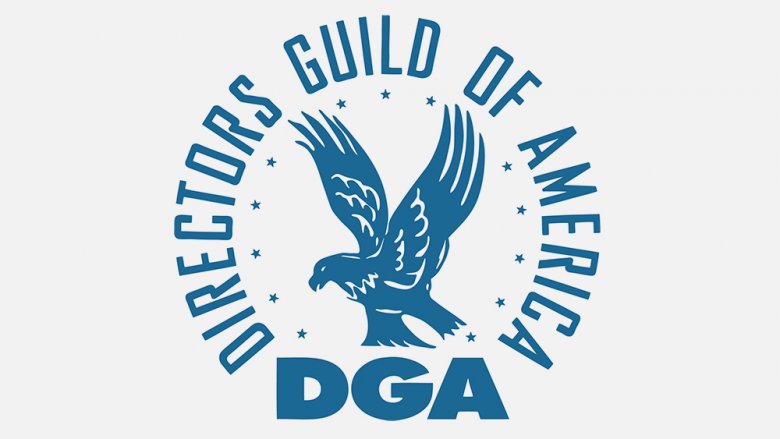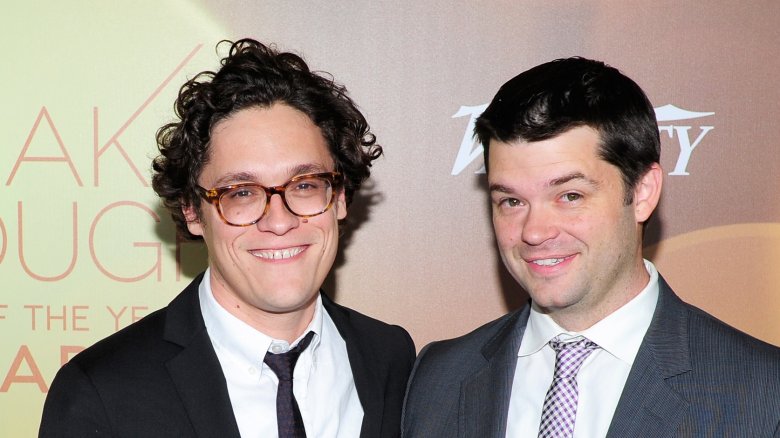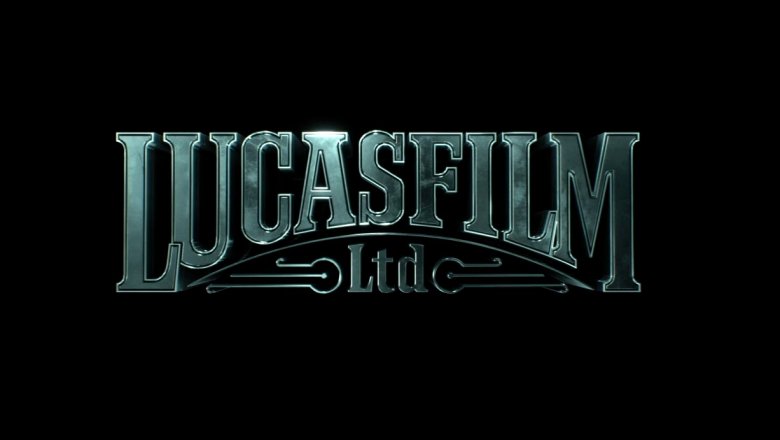What Really Happened Behind The Scenes Of The Han Solo Movie?
Lucasfilm stunned Star Wars fans on June 20 with the sudden announcement that, more than four months into production, directors Phil Lord and Christopher Miller were leaving the studio's untitled young Han Solo anthology film. The plot quickly thickened as reports emerged that the pair was actually fired over conflicts with Lucasfilm president Kathleen Kennedy and screenwriter Lawrence Kasdan.
With Oscar-winning director Ron Howard now at the helm of the project, and details of Lord and Miller's troubled production still trickling out, here's a look at what really happened behind the scenes of the young Han Solo movie.
Lord and Miller knew how they wanted to run things
Lucasfilm president Kathleen Kennedy has hired less experienced directors for the most recent Star Wars films, with Monster's Gareth Edwards getting the reins for Rogue One and Looper's Rian Johnson in charge of The Last Jedi. Even Episode IX's Colin Trevorrow, who now has blockbuster experience on Jurassic World, caught Kennedy's attention before the feature for his work on the indie Safety Not Guaranteed.
Like The Force Awakens director J.J. Abrams, Lord and Miller don't fit this mold. The two have been working in both film and television for years and have dozens of credits to their names, including big hits like Cloudy with a Chance of Meatballs, The Lego Movie, and the 21 Jump Street franchise. Unlike some of the franchise's past directors, the pair had experience with large budgets and well-known properties, and this reportedly gave them certain expectations about their control on set.
Sources say Kennedy was very involved in the production, disagreeing with the way the directors interacted with the cast and crew and causing a "culture clash" from day one — as one source put it, "She didn't even like the way they folded their socks." These differences were apparently exacerbated over time, ultimately leading to the break.
Those reports notwithstanding, Kennedy's production style has been defended by Last Jedi director Johnson, who responded to a fan's tweet about the firing by insisting that he "had as much creative control on TLJ as I've ever had on any of my own movies." Rather than a case of micromanagement, in other words, this may just be an old-fashioned culture clash.
The studio didn't want all-out comedy
In the official announcement about Lord and Miller directing the Han Solo movie, both Kennedy and screenwriter Lawrence Kasdan cited the pair's sharp wit as one reason they were chosen for the project. However, as it turns out, a focus on comedy might have been what sealed the duo's fate.
According to one unnamed individual involved with the production, the duo had fundamentally different ideas about the character of Han Solo. "People need to understand that Han Solo is not a comedic personality," the source said. "He's sarcastic and selfish." Another source speculated that the pair felt they'd been hired to make a comedy, while Lucasfilm just wanted a comedic touch.
As dailies started to come in, this disagreement over direction reportedly became more and more worrisome to Lucasfilm, with execs determined to ensure that the movie didn't deviate too far from the house style.
Lord and Miller allowed a lot of improv
This was exacerbated even further by the fact that the directors reportedly allowed and encouraged improvisation on the set. This isn't exactly uncommon in Hollywood, but it's more complicated when working within epic sagas like Star Wars, whose every word has to be pored over to ensure continuity with other installments.
Lord and Miller recruited a cast of talented improvisers, including Atlanta's Donald Glover and Fleabag's Phoebe Waller-Bridge, but Lucasfilm reportedly wanted takes that stuck closer to the script—a script written by Star Wars royalty Lawrence Kasdan, who's been with the franchise since The Empire Strikes Back. Kasdan and Kennedy have been working together for years, and both were rumored to be unhappy with the deviations.
There were apparently mixed feelings about the improvisation on set. One source said the improv was used for more than just adding comedy, with the directors seeing it as a way to bring out the actors' best work. Another argued that, while improv worked for Lord and Miller on smaller sets, it was more of a hindrance when there were hundreds of crew members waiting to be told what to do.
Major deviations from the script
To make matters even worse, reports say the script deviations may have gone further than just improvising a few lines. According to some sources, the amount of improvisation and script changes they allowed actually changed the story—a big no-no for Kennedy and Kasdan. Some reports say the duo would film multiple takes, including some with improvisation and others that stuck to the script in an effort to appease the studio; either way, it didn't seem to be enough for Kennedy and Kasdan.
These fundamental changes reportedly continued to sour the relationship between the filmmakers and the studio as dailies came in. Lucasfilm wanted Lord and Miller to add their style to the story structure they'd been given, while the duo felt it was up to them to change the film as they saw fit.
The directors felt they were under extreme scheduling constraints
Lord and Miller reportedly believed they weren't given enough time to complete the film, with the two feeling that they were under "extreme scheduling constraints" and "never given enough days for each scene from the very beginning." This has been a problem in the Star Wars universe before—J.J. Abrams engaged in a "tug of war" with the studio to push back what he reportedly thought was an unrealistic production start date for The Force Awakens.
For Lord and Miller, the tight timeline apparently resulted in the pair allegedly filming fewer camera angles and different versions of scenes than Lucasfilm would have liked. One particular day, Lord and Miller reportedly didn't start shooting until 1PM and used only three camera setups—compared to the 12 to 15 Lucasfilm was expecting—which helped finalize Kennedy's decision.
The directors were indecisive
Sources close to production said Lord and Miller, despite their experience, had trouble with many of the tough choices directors have to make on big-budget films. "You have to make decisions much earlier than what they're used to," said one source. "I don't know if it's because there were two of them, but they were not decisive."
Apparently, this indecision undermined the directors' bond with a number of crew members, and production department heads allegedly complained to Lucasfilm. Although the duo were said to be receptive to complaints, their approach didn't change—further deepening the gap between the directors, their crew, and Lucasfilm.
Lucasfilm wasn't looking for auteurs
In the 1960s, a group of French critics came up with the "auteur theory," which argues that the director is ultimately the author of a film. However, under today's big-budget blockbuster model, this is less often the case; studios don't want a visionary for a franchise picture, they want someone who can deliver a product in the house style on time and on budget.
Lord and Miller bring their signature stamp to everything they do, which has led to left-of-center projects like The Lego Movie and 21 Jump Street paying huge financial dividends. The pair have a distinct vision for their projects that resonates with viewers, even when it's based on a seemingly risky property.
While this has put the two in high demand, it reportedly ended up being the opposite of what Lucasfilm was looking for with Star Wars, and made Ron Howard—a member of George Lucas' inner circle since he starred in the director's American Graffiti in 1973—a more appealing alternative.
Unwillingness to compromise
All of these issues could have been worked out, but neither the directors nor Lucasfilm were reportedly willing to compromise. It's easy to see why both sides would be protective of their work. For Lord and Miller, the movie would have had their names on it, and they wanted to make it the way they wanted to make it. For Lucasfilm, there were hundreds of millions of dollars on the line, and the studio had a franchise legacy to protect.
This unwillingness to compromise reportedly made the studio nervous, with Kennedy worrying that, if Lord and Miller weren't listening to the company's demands during principal production, that wasn't going to change during reshoots. With neither side willing to budge, something had to give—and it wasn't going to be the studio.
There were other behind-the-scenes shake-ups
Lucasfilm reportedly looked at other ways to fix the project, including replacing Macbeth editor Chris Dickens with Oscar-winning The Martian editor Pietro Scalia as production moved from London to the Canary Islands in May. The studio also reportedly brought in an acting coach for star Alden Ehrenreich months into production—an unusual move that late in the process. (Maggie Kiley, who worked with Lord and Miller on 21 Jump Street, was brought in at the directors' suggestion.) However, neither of these changes had the effect the studio was hoping for.
Switching directors isn't unprecedented for Star Wars movies
The young Han Solo movie isn't the first Star Wars film to be plagued by directorial drama: the franchise's first anthology film, 2016's Rogue One, also had its fair share of issues. Although Lucasfilm didn't go so far as to fire director Gareth Edwards, screenwriter Tony Gilroy was rumored to play a big part—as in, potentially a directing part—in the movie's extensive reshoots.
As with the Han Solo project, a struggle over tone was blamed for the Rogue One reshoots, which were said to be expansive. The changes altered the film's ending, and proved Lucasfilm were willing to shell out top dollar to fix a perceived issue—the studio reportedly paid Gilroy $5 million for his work.
It all ended up working out for Rogue One, which was a critical and commercial success, but behind-the-scenes drama on a second Star Wars movie can be seen as potentially worrisome. Although it's hard to say for sure what happened on either film, it's equally hard not to wonder whether struggles over the franchise's direction will ultimately have a negative effect on the franchise.
The directors were unwilling to cede control
Lucasfilm has experience working around directors, as they did with Edwards for Rogue One, but the far more experienced Lord and Miller were reportedly unwilling to yield that much control. Kennedy allegedly looked to Kasdan to play fixer, but Lord and Miller had no interest in letting him take over.
The power struggle came to a head when Kasdan, at Kennedy's request, flew to the London set, where he reportedly chafed at Lord and Miller's deviations from the script and the limited number of shots they were finishing. Kennedy was left to make an extreme decision.
Ron Howard had Lucasfilm experience
While some thought that Kasdan, also an experienced director, might take over the project after Lord and Miller's departure, Ron Howard ended up landing the job. Howard was a safe choice, having already worked with the company on 1988's Willow; the director also previously revealed that he was asked to direct the first Star Wars prequel, The Phantom Menace.
Howard also has the benefit of an Oscar to his name, along with quite a few big film credits, making him an experienced enough name to reassure the cast and crew that the movie's in good hands. Reports even say that the crew broke into applause when they heard Howard would be taking over. Howard also seems very excited to be on board—shortly after the announcement, he tweeted that he's been a fan of the franchise since the first film's release on May 25, 1977 and added, "I hope to honor the great work already done & help deliver on the promise of a Han Solo film."
Who gets the credit?
This is a complicated situation for the Director's Guild of America, which now faces the difficult task of deciding who ends up with the director's credit on the movie. While Lord and Miller clearly have a claim, having shepherded filming for nearly five months, Howard also will play a big role.
The DGA doesn't like putting more than one name on a project, but they've made exceptions for directing teams like Lord and Miller. Putting three names on, however, could be a big issue for the guild. Sources say it'll likely take months for the DGA to decide, and if they're unhappy with that decision, Lord and Miller will be able to appeal.
Even once the issue of credit is settled, questions remain. Will Lord and Miller be invited to the premiere? If they're listed as directors, will they still want their names on the movie? The fallout from their firing could continue for months, if not years.
Lord and Miller should land on their feet
Lord and Miller lost out on a high-profile project, but fans don't need to worry about the duo's career prospects. They're likely to remain in demand—in fact, they may even already have a project waiting for them.
The pair previously worked on a treatment for DC's The Flash, the famously troubled project which has already shed two directors. Although it's possible that after clashing with a huge studio on an established property, they may not be interested, it'd make a lot of fans happy—and unconfirmed reports allege they've already held meetings about the possibility.
As far as confirmed future projects, the duo wrote the script for The LEGO Movie Sequel and are set to produce Channing Tatum's R-rated Netflix animated comedy America: The Motion Picture. They also penned a script for an animated Spider-Man movie, set to be released in December 2018.
Lucasfilm may have a systemic problem
The young Han Solo film isn't the first in the modern Star Wars franchise to experience issues. Josh Trank was famously dismissed from a planned Star Wars spinoff following his disastrous Fantastic Four; Edwards saw his vision for Rogue One altered in reshoots; and even Abrams had some struggles during production on The Force Awakens. Some believe that the shake-ups could be the result of a systemic problem within Lucasfilm, with the studio's need for control potentially becoming a huge issue that'll worsen as they expand and release more movies.
It's worth noting that not everyone shares this view. Rian Johnson, the Looper director Kennedy picked for The Last Jedi, is held up as an example of a director who managed to run his production with only minor interference from Lucasfilm. Time will tell whether Johnson's the exception or the rule.
